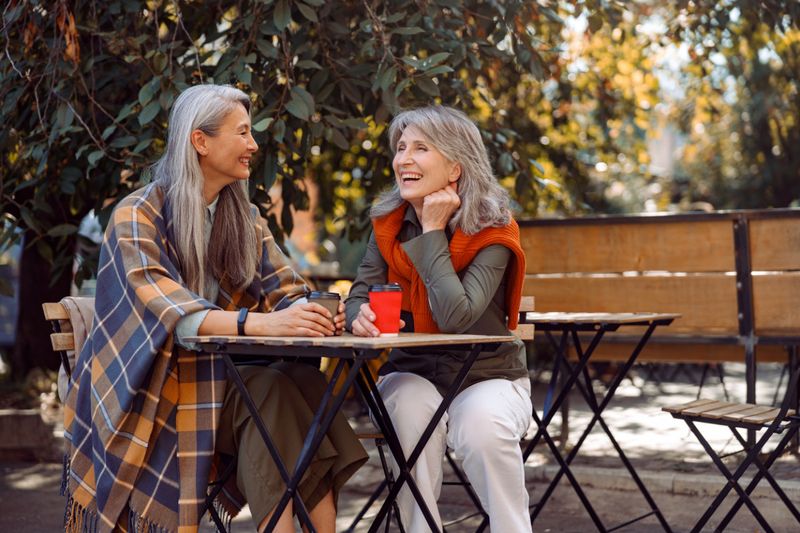In a world where technology dominates daily life, countless old school habits that once structured our lives are fading into oblivion. Our grandparents, however, often reminisce about simpler times when these habits brought a sense of community, respect, and tranquility.
This blog post explores 17 such habits that older generations fondly remember and wish were still prevalent today. Each habit is a symbol of a bygone era, reflecting values of connection, thoughtfulness, and presence that seem to be slipping away.
Read on to discover the nostalgic practices your grandparents might miss, and perhaps, be inspired to revive some in your own life.
1. Sitting down for dinner every night
Gathering around the dinner table was more than a meal; it was a cherished ritual. Stories were shared, laughter resonated, and bonds strengthened. This daily practice allowed families to connect deeply, offering a time to pause and reflect on the day.
Everyone had a chance to speak, fostering an environment of listening and understanding. In today’s fast-paced world, this simple act of sharing a meal together seems rare.
For older generations, these dinners provided a sense of stability and tradition that is often missed. The aroma of home-cooked meals and the sight of loved ones gathered together evoke memories of warmth and unity.
2. Calling instead of texting
Before the era of instant messaging, phone calls were the primary mode of communication. The sound of a loved one’s voice provided comfort and clarity that texts can’t replicate. Calls were personal, offering nuances in tone and emotion.
Taking the time to call someone was a sign of care and intention. It was about connecting beyond mere words, fostering genuine conversations.
Grandparents remember the anticipation of hearing the phone ring, signaling a personal touchpoint in their day. This old school habit fostered deeper relationships, creating memories that texting often lacks.
3. Writing thank-you notes by hand
The art of writing thank-you notes by hand is a tradition steeped in gratitude and sincerity. Each note was crafted with care, reflecting genuine appreciation.
In a digital age, this gesture stands out as thoughtful and personal. It showed that someone took the time to express their feelings in writing, creating a lasting impression.
Grandparents value this practice, as it represented respect and courtesy. It was more than just acknowledging a gift or gesture; it was about building and maintaining meaningful relationships.
4. Ironing clothes—just because it showed respect
Ironing clothes was once a mark of respect and presentation. Crisp, wrinkle-free attire conveyed that you cared about your appearance and the occasion.
This habit symbolized diligence and attention to detail. It was a way of showing respect to oneself and others, taking pride in looking one’s best.
For many, this simple act brought a sense of accomplishment and readiness. Although less common today, grandparents miss the discipline and self-respect this practice instilled.
5. Fixing things before replacing them
Repairing items instead of discarding them was a way of life. It taught resourcefulness and the value of preserving what one had.
This habit encouraged problem-solving skills and creativity. Fixing things brought satisfaction and a deeper appreciation for belongings.
Grandparents often recall the pride of mending a broken item and giving it a second life. This practice of sustainability is something they fondly miss in today’s disposable culture.
6. Listening to full albums, not skipping tracks
Listening to an entire album was an immersive experience. Each track was savored, revealing the artist’s journey and message.
This practice encouraged patience and presence, allowing listeners to fully engage with music.
Grandparents treasured the act of placing a needle on a record, letting it play from start to finish. It was a form of art appreciation that is often lost in today’s shuffle-play culture.
7. Keeping quiet during other people’s stories
Il ability to listen without interrupting is a valued skill. It shows respect for the storyteller and fosters genuine connection.
This habit encouraged empathy and understanding, creating space for others to share their experiences.
Grandparents remember a time when conversations were about listening as much as speaking. They miss the attentive silence that allowed stories to unfold naturally, strengthening bonds.
8. Sharing recipes instead of links
Sharing recipes was a way of passing down traditions and family secrets. Each recipe came with stories and love, often shared during kitchen gatherings.
This practice connected generations, preserving culinary heritage and memories.
Grandparents cherish these handwritten treasures, which hold more than just ingredients—they capture moments and relationships that digital links can’t replicate.
9. Cleaning the house for guests—even surprise ones
Keeping a home ready for guests was a sign of hospitality and pride. It demonstrated respect and care for those who visited.
This habit instilled discipline and attention to one’s surroundings. It was about creating a welcoming atmosphere.
Grandparents appreciated the joy of hosting, feeling a sense of fulfillment in offering a tidy and inviting space. This tradition of readiness is often missed in today’s casual hospitality.
10. Dressing up for travel
Travel was once a formal affair, and dressing up for the journey was part of the excitement. It showed respect for the places one visited and for fellow travelers.
This practice added a sense of occasion to trips, making the experience feel special and anticipated.
Grandparents remember the elegance and anticipation of travel with fondness, missing the days when journeys were celebrated through thoughtful attire.
11. Buying gifts year-round—not just during sales
Gift-giving was a thoughtful process that extended beyond holidays. Finding the perfect gift was about sentiment and understanding the recipient.
This practice showed care and attentiveness, often resulting in meaningful presents that resonated deeply.
Grandparents cherished the joy of giving gifts that weren’t bound by commercial timelines. They miss the personal touch and consideration that came with spontaneous gifting.
12. Spending Sundays unplugged and together
Sundays were sacred days of rest and connection. Families spent time together, unplugged from the hustle and bustle of everyday life.
This tradition fostered relaxation and bonding, creating memories that lingered long after the day ended.
Grandparents reminisce about the calm and closeness of these unplugged Sundays, wishing for their return in our digitally-driven world.
13. Tending a garden as therapy
Gardening was more than a hobby; it was a form of therapy. It offered a sense of purpose and connection to nature.
This practice nurtured patience and mindfulness, allowing for quiet reflection and growth.
Grandparents find solace in tending to their gardens, appreciating the peace and fulfillment it brings. It’s a cherished habit that many wish to see revived in today’s fast-paced lifestyle.
14. Reading the newspaper front to back
Reading the newspaper was an informative ritual. It provided a comprehensive view of the world, fostering knowledge and awareness.
This habit encouraged critical thinking and reflection, offering a deeper understanding of daily events.
Grandparents miss the tactile and immersive experience of reading the newspaper, longing for the quiet morning moments spent absorbing its pages.
15. Treating neighbors like extended family
Neighborhoods were more than just places to live; they were communities of care and support. Neighbors looked out for each other like family.
This practice fostered a sense of belonging and security, creating lasting friendships and shared memories.
Grandparents fondly remember the warmth of neighborly connections, missing the days when communities were tightly knit and supportive.
16. Knowing when not to speak
Silence can be powerful. Knowing when not to speak showed wisdom and respect for others’ thoughts and feelings.
This habit encouraged introspection and patience, allowing conversations to breathe.
Grandparents valued the art of quiet presence, missing the grace and understanding it brought to interactions. It’s a skill that often feels lost in today’s constant chatter.
17. Making time for “just sitting” without guilt
The simple act of sitting quietly was once seen as a valuable use of time. It provided space for contemplation and peace.
This habit nurtured self-awareness and mental clarity, offering a break from the demands of daily life.
Grandparents often reminisce about the joy of just sitting, free from distractions and obligations. It’s a practice they miss, as it brought balance and perspective.


















